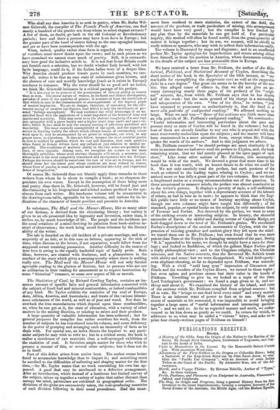Who shall say that America is to seek in-poetry, when
Mr. Rufus Wil- mot Griswold, the compiler of The Female Poets of America, can find nearly a hundred of the gentler sex from whom to select elegant extracts ? A few of them, no doubt, go back to the old Colonial or Revolutionary ,periods; here and there a poetess may have been born in Europe ; but -the greater part of the band of sisters belong to the star-spangled banner, and are or have been contemporaries with the age. When, indeed, quality rather than form is regarded, the very number of versifiers must throw doubt upon the verse; and in such pieces as we have examined we cannot trace mach of poetry. Still, it is extraordi- nary how good the imitative article is. It is not that Great Britain could not furnish such a selection, but we doubt whether Italy herself, with her facile language, could do it, if the Italian ladies were of a deeper blue. Why America should produce female poets in such numbers, we can- not tell, unless it be that an easy state of subsistence gives leisure, and the absence of care and worldly knowledge (such as it exists in Europe) conduces to romance. Why the verse should be so good and no better, we think Mr. Griswold intimates in a critical passage of his preface. " It is less easy to be assured of the genuineness of literary ability in women than in men. The moral nature of women, in its finest and richest development, partakes of some of the qualities of genius; it assumes at least the similitude of that which in men is the characteristic or accompaniment of the highest grade of mental inspiration. We are in danger, therefore, of mistaking for the efflo- rescent energy of creative intelligence, that which is only the exuberance of per- sonal ' feelings unemployed.' We may confound the vivid dreamings of an un- satisfied heart with the aspirations of a mind impatient of the fetters of time and matter and mortality. That may seem to as the abstract imagining of a soul rapt into sympathy with a purer beauty and a higher truth than earth and space ex- hibit, which in fact shall be only the natural craving of affections undefined and wandering. The most exquisite susceptibility of the spirit, and the capacity to mirror in dazzling variety the effects which circumstances or surrounding minds work upon it, may be accompanied by no power to originate, nor even, in any proper sense, to reproduce. It does nut follow, because the most essential genius an men is marked by qualities which we may call feminine, that such qualities when found in female writers have any certain or just relation to mental su- periority. The conditions of aesthetic ability in the two sexes are probably dis- tinct, or even opposite. Among men, we recognize his nature as the most thoroughly artistlike, whose most abstract thoughts still retain a sensuous cast, whose mind is the most completely transfused and incorporated into his feelings. Perhaps the reverse should be considered the test of true art in woman, and we should deem her the truest poet whose emotions are most refined by reason, whose force of passion is most expanded and controlled into lufty and impersonal forms of imagination."
Of course Mr. Griswold does not bluntly apply these remarks to those writers from whom he is about to compile a book; as no chapman de- preciates his own wares. Except in the assumption of there being more -real poetry than there is, Mr. Griswold, however, will be found just and discriminating in his biographical and critical notices prefixed to the spe- ,timens from each writer. His handsome volume will be ornamental to the drawingroom-table, agreeable for its contents, and curious for its in- dications of the character of female position and pursuits in America.


























 Previous page
Previous page